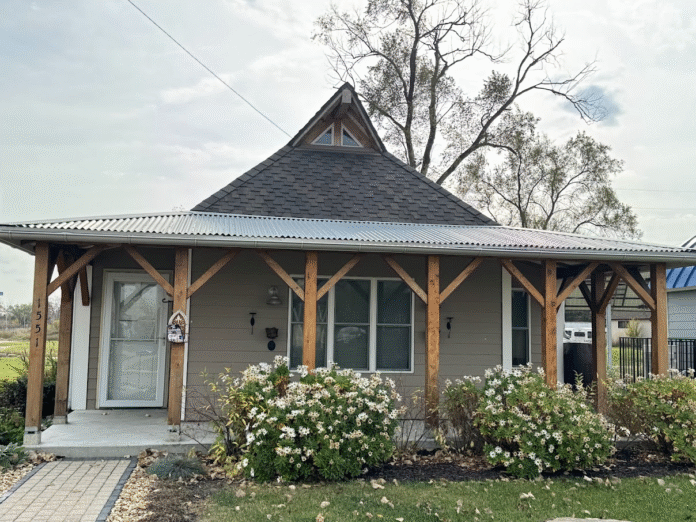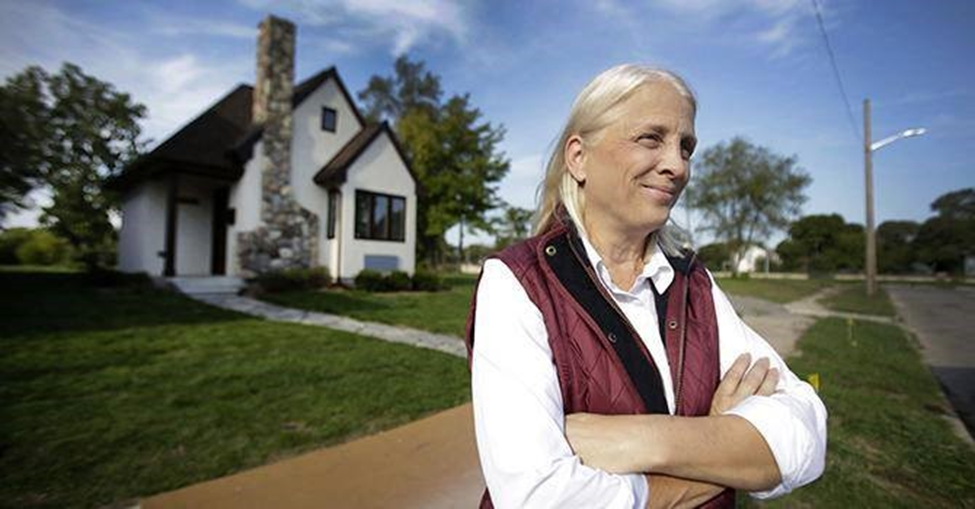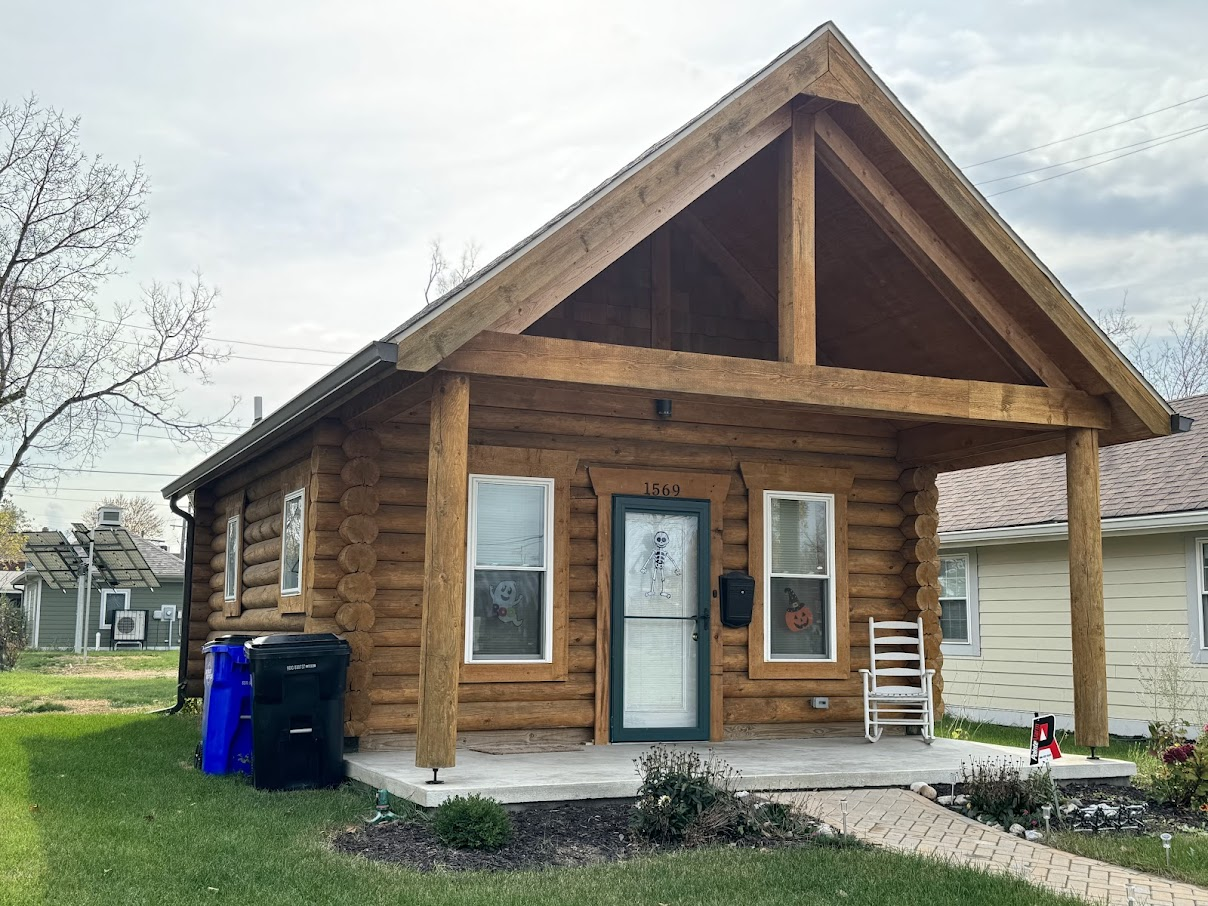
As the Quad Cities grapples with a shortage of affordable housing and rising evictions, a Detroit Methodist minister is preparing to share with local leaders the major impact a growing neighborhood of tiny houses has made in Michigan’s Motor City.
The Rev. Faith Fowler, executive director of Cass Community Social Services, will travel to the Quad Cities next month to talk about her book “Tiny Homes in a Big City” and the project that led her to publish the 240-page paperback.
Her visit kicks off with a special edition of Project NOW’s Rooting Out Poverty Book Club at the Moline Public Library on Wednesday, Aug. 13. On Aug. 14, she will be a guest speaker at the Second Annual Anchoring Opportunity Housing Summit. It is hosted by Project NOW and will be at the Martin Luther King Jr. Center, 630 Ninth St., Rock Island. Tickets for the 8:30-11:30 a.m. summit are $15 and include breakfast. To register go here.

“The goal of the summit is to bring together subject matter experts, people with lived experience and expertise, business leaders, banking institutions, educators, faith communities, medical and mental health providers, elected officials and concerned citizens to address the Quad Cities greatest challenge, housing,” Project NOW Executive Director Dwight Ford said.
The summit also will explore current data, the impact of innovative and proven approaches, community building and shared responsibility. “We envision a future with increased affordable rental housing opportunities, increased housing options and home ownership for underserved communities,” Rev. Ford added.
Tiny Homes preview
Among the innovative, proven approaches to be discussed next month is the Cass Tiny Homes project in Detroit. The visit is timely as bi-state leaders in cities including Moline and Rock Island have expressed interest in building tiny and container homes here.
During a recent telephone interview with the QCBJ, Rev. Fowler offered a glimpse of how the Cass tiny homes allow people trapped in poverty the opportunity to escape it by linking housing to home ownership.

The social services agency Rev. Fowler leads was founded in 2002.
Through Cass Tiny Homes, which began in 2016, it provides residential stability and economic mobility for low-income individuals through its affordable, solar-powered housing for low-income individuals. Project residents pay $1 per square foot for seven years. The only utility cost is electricity.
The houses may be tiny, but the impact they have made has been anything but, Rev. Fowler said. Consider that, after the first house was completed and received attention from a Detroit TV station, a California man named David Wolfe created and posted a video about it on social media. “It had millions of views, then somebody else did a second video,” Rev. Fowler said. In all, they garnered 90 million game-changing views.
“You know, everybody says, ‘Oh, I want to be on the Oprah show,” Rev. Fowler said, adding “No, you don’t. It’s going to crash your website. That’s how I felt here that we, A, hadn’t pitched it to him, so we didn’t expect it, and B, we weren’t ready for it.”
Book wins rave review
Not all who read the posts had nice things to say, but plenty did as donations rolled in and the story spread. It also led her to publish a 2018 book which earned rave reviews including from Michigan’s former U.S. Rep. John Dingell, author of the 1972 Clean Water Act; and Michelle “M.J.” Boyle, Tiny House designer, builder, occupant and advocate.
“If you’re looking for a book that will shake your presumptive soul about what home ownership means to society and to those who have never dreamed they could have one of their own, this is it,” Ms. Boyle wrote for a blurb on the back cover.
The Cass Community Social Services campus is a one-stop shop for those in need. It prepares and serves 700,000 meals a year, houses 350 unhoused men, women and children a night in emergency housing and another 100 a night in permanent supportive housing. Cass also has a free medical clinic, a day program for adults with developmental disabilities and provides vocational training and jobs.
“We do it all on a campus, so that if you come to us for one thing, you can walk to another place to get the services that you seek,” Rev. Fowler said. That campus provides job training and retraining.
It launched its Tiny Home project in 2016 to provide residential stability and create economic mobility for extremely low income people, including those who had been homeless, aged out of the foster care system or are senior citizens.
“It’s a mixture of people, but all who have a very low salary entitlement, they agree to live in the house and participate in the program for seven years, which includes meeting with other residents and meeting with a financial coach and volunteering in the neighborhood.”
Rent $225-$450 a month
The homes cost $1 a square foot – or $225 and $450 a month – to rent. That is less than half of what the residents would pay elsewhere, she said. Their only utility bill is for electricity, but every house has a solar array that pays impressive dividends.
“This summer, I read that one of the residents said she’d done so well by the sun, that she got $6 back,” Rev. Fowler added. “That made me happy.“
The growing village of Tiny Homes has all been done with private, not government, funding. That’s intentional. “Since it was a new program, the first of its kind, we didn’t want somebody else telling us how to run it, and who probably didn’t know any homeless people personally,” Rev. Fowler said.
The current development’s 25 completed and occupied homes are within three and a half blocks of one another in an older neighborhood where, Rev. Fowler said, “we have the ability to go up to 40 to 45.” For example, eight more tiny homes are under construction right now
Cass also has passed its first two deeds to new homeowners and another homeownership turnover is expected this year. Three more are coming to the Detroit neighborhood next year.
The homes were built in an older existing and declining neighborhood and were completed in stages, so the neighborhood is never under construction all at once.
Every house also is different both inside and out, “which costs a little bit more, but I think is important,” Rev. Fowler said. “If you’ve come from low income housing, and know that it’s identical, or as I say, ugly, you really appreciate having something that’s distinctive and attractive.”
That uniqueness also gives the occupant a real sense of ownership unlike public housing units which tend to be uniform in looks and feel.
Construction costs rise
As Detroit’s tiny homes continue to grow Rev. Fowler said building houses has gotten more expensive. Prior to COVID-19, it cost about $75,000 to build a house, with about $20,000 of that going to the slab foundation, she said. Those costs have gone up since and could rise more as federal policies impact prices and markets.
Despite the extra expenses, Rev. Fowler said, the structures’ permanence is essential.
“I didn’t want to create a place with wheels because I’m from Detroit,” she told the QCBJ. “I know anytime you pull anything else out of the parking lot, it’s worth less money. We wanted something that would increase in value, so we built them on slabs, on grades. “
Cass is still all about saving money when it can. It uses volunteers when it legally can such as to lay floors and do roofing and painting and it is happy to get cash and donated and discounted materials.
Despite the newness of the concept, Rev. Fowler said, the City of Detroit did not put up any roadblocks. “We’re putting tiny homes where houses used to be, so it’s already zoned for residential,” she said. No variances are required because no city money is used.
“And the neighborhood, surprisingly, was very excited about it, because nothing has been built here since 1973” and that was a garage, Rev. Fowler added.
“So for neighbors to see a stick building going up and the people moving in was a really good thing. It actually increased the property values around us.”
Tiny homes, global interest
The Tiny House neighborhood also has become a tourist attraction for people from all over the world. Paris Mayor Anne Hidalgo, for example, made her way to the Cass Tiny Homes site shortly before her city hosted the 2024 Summer Olympics.
“So truly, people have seen videos or heard stories, and they come from all over to see it, take pictures and think about what they could take back home, which is kind of exciting,” Rev. Fowler said.
Despite all the attention, it’s the homeownership component of the Detroit Tiny House project that is especially important since so many of the people that Cass serves are just a catastrophe or two away from homelessness. Rev. Fowler likened life challenges to a boomerang bringing them back to where they were before they found housing. “The reason was they’d run into an ordinary life situation that wouldn’t throw most of us, but for them, it was catastrophic.”
Say, for example, a car breaks down and the breadwinner can’t get to work and loses their job. Or somebody in the family gets sick and there is no health insurance or to care for them besides the head of the household who stays home and becomes jobless as a result.
“So they’ve done everything right, everything we tried to teach them to do, and yet they still come back as homeless, and now they’re more depressed than the first time, because they did everything right,” Rev. Fowler explained.
Sharing American Dream
“So I worried about them, and then my mother died, and when she died, I got a house. I didn’t need a house, and I certainly wouldn’t have traded her for the house, but it dawned on me for the first time that it is the American Dream, and that we pass on generational wealth in ways that poor people never do,” she added.
Take the tiny houses, which are relatively cheap to rent during the seven-year run of the program, but they’re not free and they require more than money. Those selected to rent the homes must be ready to make a substantial change in their life and are required to work the Cass program.
“We want to make sure you’re ready for it, that you’re not going to lose it, that you understand about paying taxes and paying water, and you know when to change the filters, and you’ve got an emergency fund set up and all that,” Rev. Fowler explained.
The program has tangible evidence of the power of home ownership and equity for people who want something more and “all of a sudden, they’re dreaming of what they can do when they don’t have to pay rent anymore. “
Take for example, one of Cass houses first renters. He moved in without even a bicycle to his name. After working the program for seven years “he has a car and a job, and he moved out and rented his house. Now he’s a landlord. … Isn’t that the coolest thing? He probably would never have envisioned that for himself.”




